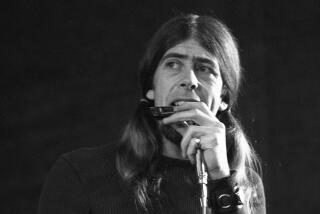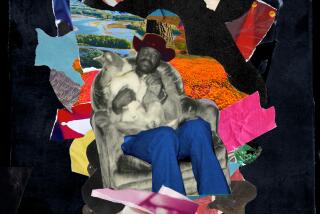A Blues Career of Enduring Eloquence
- Share via
When John Lee Hooker was between 5 and 7 years old, his sister’s boyfriend, local Mississippi blues man Tony Hollins, gave the boy one of his old guitars to steer him clear of the couple’s courting territory. It was the 1920s, and little John Lee took to the Delta woods with his guitar, dodging his father, the Rev. William Hooker, whose thunderous disapproval of devil-driven music would have halted his playing. Other than church singing, the reverend banned all music from the house, a bleak fundamentalist stance that did little to dampen John Lee’s spirited ambition to learn the blues.
Raised on a plantation near the small town of Vance, Miss., John Lee decided that he had more or less two choices with his life. He could, like his father and most of his family and friends, stay home, finish school and raise a family, supporting them by farming and sharecropping. Or he could continue with the blues.
The blues won out. “The second young John Lee got his hands on the discarded instrument, whatever interest he may have had in his schooling went right out of the window. ‘When I was a kid comin’ up, I would pretend I was goin’ to school and hide out in the woods with my old guitar. When the other kids came out of school, I came back along with them like I’d been to school. I hadn’t been to school for a long time, and then they caught me and used to whup and beat me. . . .’ ”
Charles Shaar Murray’s enthusiasm for Hooker, the man and the musician, never wanes in his biography “Boogie Man: The Adventures of John Lee Hooker in the American Twentieth Century.” As Murray sees it, nobody else but Hooker could have come up with the particular style and sound that have made him the legendary bluesman that he is. It is a view that might seem a mere truism, yet Murray makes the case compellingly clear.
“The story of John Lee Hooker’s life is, essentially, the story of his resistance to any and all attempts to change him, to dilute an intrinsic sense of self which has successfully withstood all pressure, including those of institutionalized racism, family, church and the music business.”
Ditching school may have caused him to be illiterate, but his drive--to express himself and communicate with others--transformed his blues into a primary language, one through which he achieved stunning and enduring eloquence.
Because Hooker didn’t read music, he rarely sang a song the same way twice, a situation that gave his music a spontaneous urgency that keeps it dynamic. This kind of musical fluidity was reinforced by the loose dealings of record companies during Hooker’s early days that kept Hooker and his Coast to Coast Blues Band near-broke for years. This situation encouraged him to rerecord songs under different titles, sometimes with pseudonyms, for different record companies.
Eventually, as Hooker’s fame increased, the payment style of the record companies adjusted accordingly--more or less. Hooker’s wide popularity, beginning in the 1960s, led him to play with a range of famous blues-influenced musicians, including Van Morrison, Bonnie Raitt, Eric Clapton, the Rolling Stones and Canned Heat. Murray provides an intelligent analysis of the various strains of popular music with which Hooker’s blues became entwined. Folk, pop, rhythm and blues and rock ‘n’ roll all came under the sway of Hooker’s emotionally intense, rich, broody voice.
Murray also dispenses with the temptation to view white musicians as “neocolonialist expropriators” of the blues. “Anyone who’d suggested in those early days . . . that there were fortunes to be made, and lifetime careers to be enjoyed, by English kids playing rhythm and blues, would have been mercilessly derided.”
British and American musicians imitated what they loved, altering sound to suit their own backgrounds, and, as Murray points out, any resulting disparity in fame and fortune reflects mostly on racist tendencies in the music industry and in the culture supporting it. Hooker himself sees no near end to his music, or as he puts it: “I’ll never retire. . . . I’ll never--I’ll never--get out of these blues alive.”
More to Read
The biggest entertainment stories
Get our big stories about Hollywood, film, television, music, arts, culture and more right in your inbox as soon as they publish.
You may occasionally receive promotional content from the Los Angeles Times.










